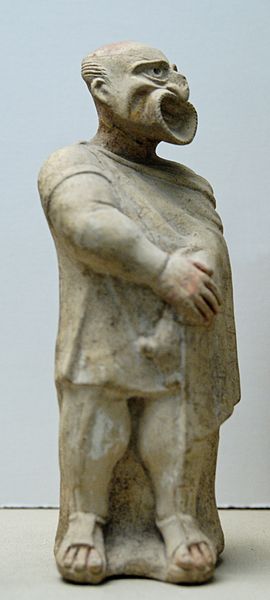Menander was a Greek dramatist and the best-known representative of Athenian New Comedy. He wrote 108 comedies and took the prize at the Lenaia festival eight times. His record at the City Dionysia is unknown.
Bust of Menander. Marble, Roman copy of the Imperial era after a Greek original (c. 343–291 BC).
Roman, Republican or Early Imperial, Relief of a seated poet (Menander) with masks of New Comedy, 1st century BC – early 1st century AD, Princeton University Art Museum
Seated portrait of Menander, Roman fresco from the Casa del Menandro in Pompeii
A papyrus fragment of the Perikeiromene, ll. 976–1008 (P. Oxy. 211 II 211, 1st or 2nd century AD)
Ancient Greek comedy was one of the final three principal dramatic forms in the theatre of classical Greece. Athenian comedy is conventionally divided into three periods: Old Comedy, Middle Comedy, and New Comedy. Old Comedy survives today largely in the form of the eleven surviving plays of Aristophanes; Middle Comedy is largely lost, i.e. preserved only in relatively short fragments by authors such as Athenaeus of Naucratis; and New Comedy is known primarily from the substantial papyrus fragments of Menander.
Actor on a Sicilian red-figured calyx-krater (c. 350–340 BC).
Terracotta comic theatre mask, 4th/3rd century BC (Stoa of Attalus, Athens)
Marble image of a theatre mask, 2nd-century BC.
An actor in the mask of a bald man, 2nd century BC








